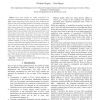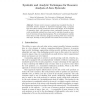605 search results - page 14 / 121 » Dealing with logical omniscience |
AI
2007
Springer
13 years 7 months ago
2007
Springer
Since belief revision deals with the interaction of belief and information over time, branching-time temporal logic seems a natural setting for a theory of belief change. We propo...
MEDINFO
2007
13 years 9 months ago
2007
Terminologies are increasingly based on “ontologies” developed in description logics and related languages such as the new Web Ontology Language, OWL. The use of description l...
EUSFLAT
2009
13 years 5 months ago
2009
Fuzzy Logic Systems are widely recognized to be successful at modelling uncertainty in a large variety of applications. While recently interval type-2 fuzzy logic has been credited...
CCA
2009
Springer
13 years 11 months ago
2009
Springer
Abstract. In this paper we study a new approach to classify mathematical theorems according to their computational content. Basically, we are asking the question which theorems can...
TGC
2010
Springer
13 years 5 months ago
2010
Springer
Recent work in resource analysis has translated the idea of amortised resource analysis to imperative languages using a program logic that allows mixing of assertions about heap sh...


